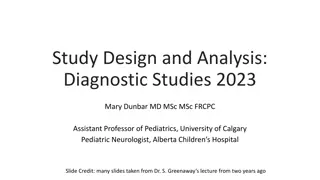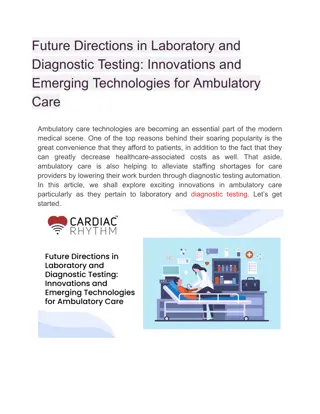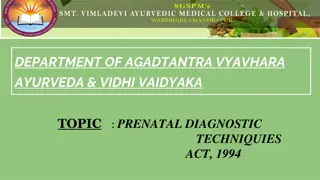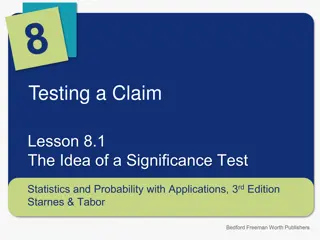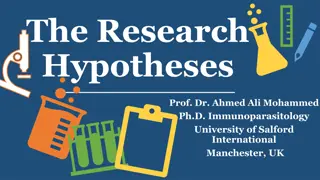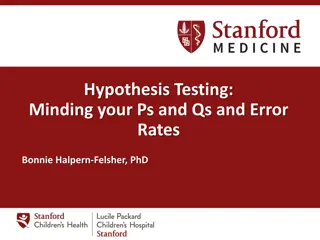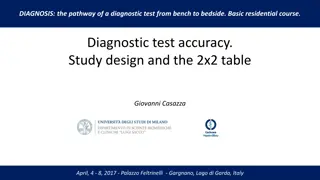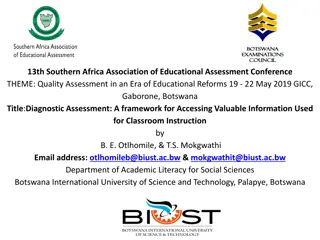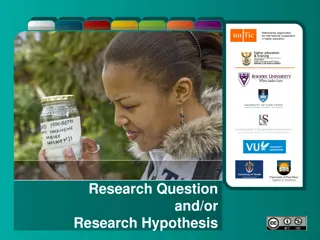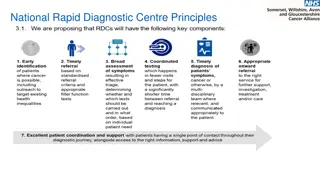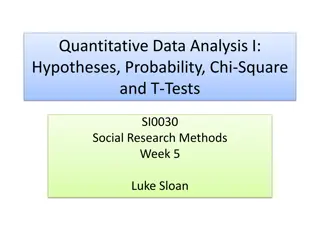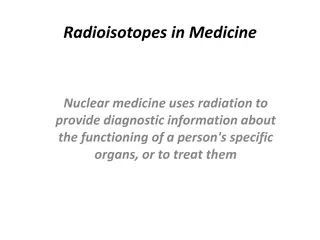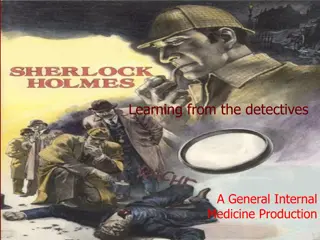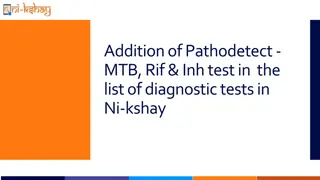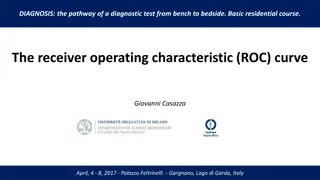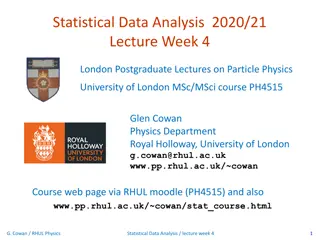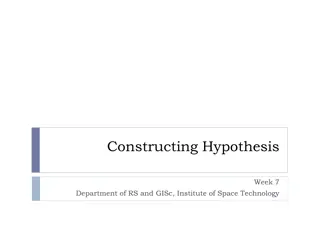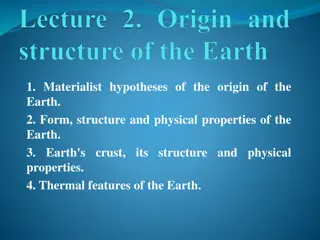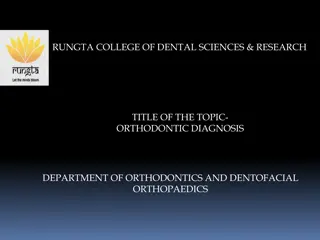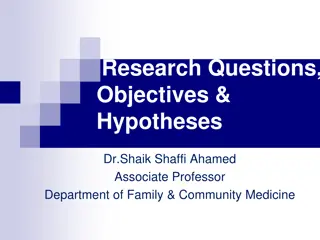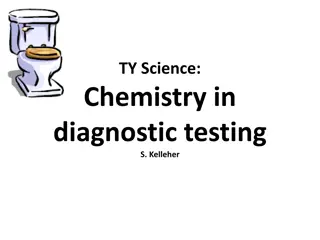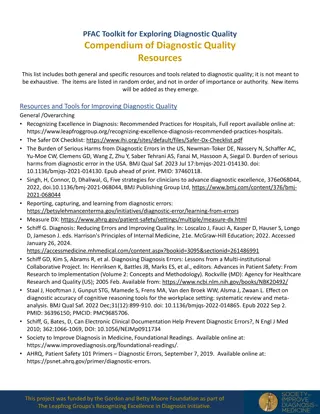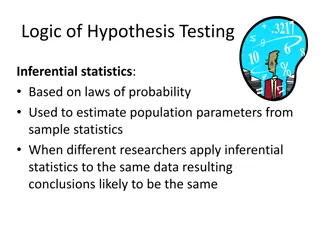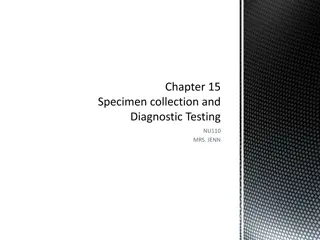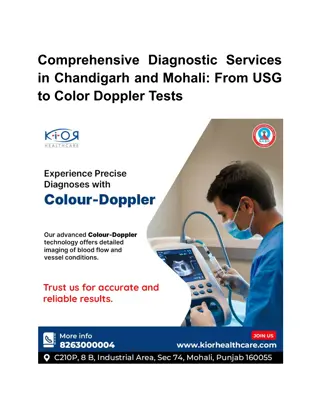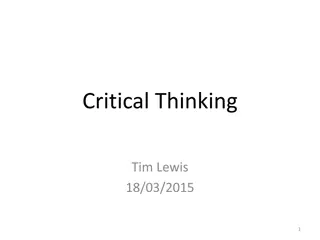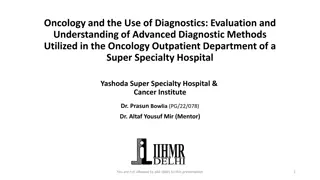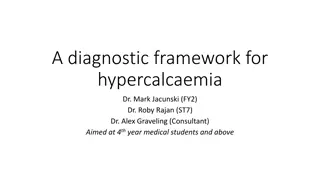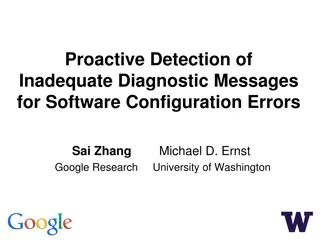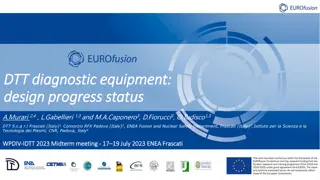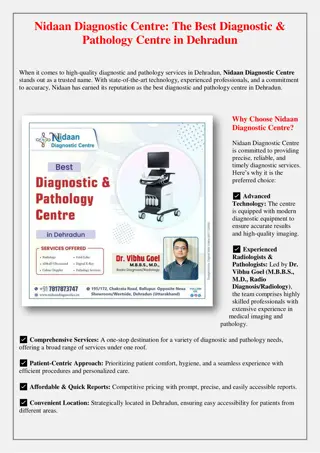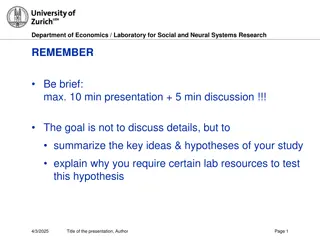Inferential Statistics
Hypothesis testing is a key aspect of inferential statistics, allowing researchers to make conclusions about populations based on sample data. This process involves formulating hypotheses, conducting experiments, and determining the probability of results under different scenarios. By comparing the
2 views • 28 slides
Diagnostic Test Evaluation and Performance
Explore the intricacies of evaluating diagnostic tests, including precision, sensitivity, specificity, and factors influencing test performance. Learn about the purpose of diagnostic tests, examples across various fields, and the types of studies used to assess them.
11 views • 53 slides
Future Directions in Laboratory and Diagnostic Testing_ Innovations and Emerging Technologies for Ambulatory Care
Ambulatory care technologies are becoming an essential part of the modern medical scene. One of the top reasons behind their soaring popularity is the great convenience that they afford to patients, in addition to the fact that they can greatly decrease healthcare-associated costs as well. That asid
14 views • 5 slides
The Prenatal Diagnostics Techniques Act of 1994 in India
The Prenatal Diagnostic Techniques Act of 1994 in India aims to curb female foeticide and address the dwindling sex ratio by prohibiting prenatal sex determination. This legislation regulates diagnostic methods, prevents sex selection, and focuses on detecting genetic disorders, metabolic abnormalit
0 views • 15 slides
Significance Testing in Statistics
Significance testing is a vital concept in statistics used to analyze data and make informed conclusions about population parameters. This lesson delves into the significance test procedure, hypotheses formulation, interpreting P-values, and drawing appropriate conclusions based on statistical evide
3 views • 9 slides
Importance of Testable Hypotheses in Scientific Research
Hypotheses play a crucial role in scientific research as they provide a clear statement that can be tested. A genuine research hypothesis must be specific, testable, and falsifiable. It guides researchers in planning studies and helps in determining the outcomes. A good research hypothesis is clear,
1 views • 14 slides
Hypothesis Testing in Statistics
Hypothesis testing is essential in scientific inquiry, involving the formulation of null and alternative hypotheses at a chosen level of significance. Statistical hypotheses focus on population characteristics and are tested on samples using probability concepts. The null hypothesis assumes no effec
0 views • 26 slides
Diagnostic Test Accuracy Study: Design and Implementation
This content delves into the pathway of a diagnostic test from development to clinical application, focusing on the basic concepts of diagnostic test accuracy, study design, the 2x2 table, and key terminology. It discusses the importance of study design in assessing diagnostic accuracy, including fa
1 views • 16 slides
Enhancing Educational Assessment Through Diagnostic Techniques
Diagnostic Assessment (DA) is a valuable technique that provides detailed information about students' knowledge and skills, supporting teachers in identifying strengths and weaknesses for tailored instruction. This approach offers a more nuanced understanding than traditional assessments, contributi
0 views • 20 slides
Effective Guidance on Research Questions and Hypothesis Development
Understanding the importance of formulating clear research questions or hypotheses is crucial for the success of a study. Research questions guide the research process, while hypotheses propose explanations to be proven. This content emphasizes the significance of correctly developing research quest
1 views • 14 slides
Prostate Rapid Diagnostic Service Transformation Overview
The document outlines the transformation of the Prostate Rapid Diagnostic Service (RDS), detailing plans, due diligence requirements, implementation timelines, and good practices such as virtual telephone triage systems and use of MRI before biopsies. It emphasizes the implementation of Rapid Diagno
5 views • 8 slides
Diagnostic Specialty Antibodies Market, Diagnostic Antibody, Infectious Disease
Diagnostic Specialty Antibodies Market by Type (Primary, Secondary), Clonality (Monoclonal, Polyclonal), Technique (WB, Rapid Test, IHC, IP), Conjugate, and Application (Dengue, Malaria, Hepatitis, HIV, E. coli , Tuberculosis, Pneumonia, Cancer)- For
0 views • 3 slides
Hypotheses, Probability, and Statistical Tests in Social Research
This content delves into formulating hypotheses in social science, selecting statistical tests based on variables' measurement levels, understanding probability in statistical analysis, and distinguishing between null and alternative hypotheses. It emphasizes the research process involving hypothesi
6 views • 21 slides
Applications of Radioisotopes in Nuclear Medicine
Nuclear medicine utilizes radioisotopes to provide crucial diagnostic information about the functioning of specific organs and to treat various conditions. Diagnostic techniques in nuclear medicine involve using radioactive tracers that emit gamma rays from within the body. Positron Emission Tomogra
0 views • 19 slides
SWAG Cancer Alliance Rapid Diagnostic Services Implementation Plan
The SWAG Cancer Alliance aims to develop Rapid Diagnostic Services for patients with non-specific symptoms within Primary Care Networks. By 2028, the goal is to diagnose 75% of cancers at Stage 1 & 2, emphasizing personalized, timely diagnoses integrated with existing diagnostic provision. The appro
0 views • 8 slides
Learning from Fictional Detectives for Better Diagnostic Skills
Explore the application of lessons from fictional detectives like Sherlock Holmes to enhance diagnostic processes in medicine. Delve into problem representation, observation, deduction, and clinical reasoning strategies to improve diagnostic accuracy and patient care.
0 views • 68 slides
Enhancing Diagnostic Tests with Pathodetect in Ni-kshay Module
A new test type, Pathodetect-MTB, Rif & Inh, has been introduced for tuberculosis diagnosis in Pathodetect laboratories. This test has been added to the diagnostic tests list in the Ni-kshay module, enabling seamless reporting in TB diagnostic facilities. The process of adding this test, including s
0 views • 10 slides
Diagnostic Test Accuracy: A Practical Overview
Navigate through the pathway of diagnostic test development, implementation, and evaluation from bench to bedside. Explore the Receiver Operating Characteristic (ROC) curve, the impact of cut-off variations on sensitivity and specificity, and the practical application of continuous measurement in di
1 views • 32 slides
Hypotheses and Tests in Statistical Data Analysis
This material covers essential topics on hypotheses and tests in statistical data analysis, including defining hypotheses, critical regions, simple vs. composite hypotheses, and the goal of tests. It emphasizes the importance of critical regions in determining the validity of hypotheses and explores
0 views • 48 slides
Hypotheses in Research: Importance and Development
Hypotheses play a crucial role in research by providing direction, clarity, and focus to a study. They are educated guesses that guide researchers in testing theories and making predictions about the relationship between variables. Developing a hypothesis involves common-sense reasoning, research mo
0 views • 22 slides
Hypotheses on the Origin of Earth and Earth's Formation
Various materialist hypotheses proposed by scientists such as Kant, Laplace, Schmidt, and Fesenkov regarding the origin of Earth and the solar system. These hypotheses suggest different processes, including the formation from primary dusty matter, hot nebula, interstellar meteorite dust, and gas-dus
2 views • 16 slides
Diagnostic Approaches in Hematologic Disorders: A Comprehensive Overview
Explore the diagnostic considerations for multiple myeloma, monoclonal gammopathy of undetermined significance (MGUS), and related conditions, including indications for serum protein electrophoresis (SPEP) and free light chain (FLC) testing. Learn when not to order SPEP and FLC, and consider various
0 views • 24 slides
Orthodontic Diagnosis: Essential Tools and Techniques
This detailed guide covers essential diagnostic aids for orthodontic diagnosis, including case history, general examination, intraoral examination, supplemental diagnostic aids, orthodontic study models, diagnostic setups, facial photographs, electromyography, radiographs, recent advances, and more.
0 views • 39 slides
Formulation of Research Questions, Objectives, and Hypotheses in Epidemiological Studies
Explore the importance of defining research questions, objectives, and hypotheses in epidemiological research, illustrated through examples from studies on diabetes mellitus in Saudi Arabia. Understand the steps involved in crafting clear objectives and hypotheses to address public health challenges
1 views • 37 slides
Utilizing Different Samples for Diagnostic Testing in Medicine
The practice of diagnostic testing in medicine goes beyond blood and stool samples. Gathering urine samples, for example, allows healthcare providers to assess various health aspects, such as kidney function, urinary tract infections, diabetes, and more. By examining the color, clarity, odor, densit
0 views • 21 slides
Toolkit for Exploring Diagnostic Quality Resources
A compendium of resources and tools for improving diagnostic quality, covering general and specific aspects. It includes recommendations for hospitals, checklists, research on diagnostic errors, strategies for clinicians, cognitive reasoning tools, readings on diagnostic errors, and more. The list i
1 views • 5 slides
Inferential Statistics and Hypothesis Testing in Research
Inferential statistics in research involve estimating population parameters from sample statistics and making decisions based on probability. Researchers follow a set process, starting with preparing for a study, defining variables, stating hypotheses, selecting appropriate tests, analyzing data, an
0 views • 30 slides
Guidelines for Safe and Efficient Diagnostic Testing Procedures
This content provides detailed guidelines and procedures for specimen collection and diagnostic testing in healthcare settings, covering aspects such as patient assessment, specimen labeling, completing diagnostic requisition forms, and specific procedures like amniocentesis, arteriography, barium e
0 views • 21 slides
Comprehensive Diagnostic Services in Chandigarh and Mohali_ From USG to Color Doppler Tests
In modern healthcare, diagnostic services are essential for early detection, monitoring, and effective treatment of various health conditions. For residents of Chandigarh and Mohali, access to high-quality diagnostic facilities has never been easier.
1 views • 4 slides
Impact of Court Decision on Chiropractic Diagnostic Testing Regulations
The court case of Yagodinski v. Sutton in Nebraska involving expert testimony on traumatic brain injuries by chiropractors has raised questions about the scope of diagnostic testing allowed for chiropractic care. The court ruled that specialized tests used by chiropractors may not be admissible in c
0 views • 8 slides
Critical Thinking, Hypotheses, and Arguments
Explore the concepts of critical thinking, hypotheses, and arguments in this informative content. Learn about the definition of hypotheses, the nature of arguments, and syllogisms. Delve into the world of logical reasoning and the foundations of thought processes.
0 views • 32 slides
Evaluation of Advanced Diagnostic Methods in Oncology OPD at Yashoda Super Specialty Hospital
Cancer diagnosis and treatment necessitate continuous advancements. This research delves into the utilization of diagnostic tests in the oncology outpatient department of a super specialty hospital. Explore the objectives, methodology, and research questions to understand the diagnostic landscape in
0 views • 15 slides
A diagnostic framework for hypercalcaemia
A diagnostic framework for hypercalcaemia through a clinical case analysis targeting medical students and above. Learn to assess symptoms, outline investigation pathways, and recognize common causes of high calcium levels. Dive into interpreting bone profiles and determining the best diagnostic test
0 views • 19 slides
Hypothesis Testing in Econometrics
Concepts of null and alternative hypotheses, errors in hypothesis testing, and types of hypotheses in econometrics. Learn how to test the validity of hypotheses using statistical techniques like Chi-Square Test and make informed decisions based on sample results.
1 views • 8 slides
Introduction to Hypothesis Testing
In hypothesis testing, statisticians use formal procedures to accept or reject statistical hypotheses based on sample data compared to population assumptions. Explore the distinctions between parameters and statistics, types of statistical hypotheses, and the significance of null and alternative hyp
0 views • 12 slides
Improving Software Error Diagnostic Messages for Configuration Errors
Learn about proactive detection of inadequate diagnostic messages for software configuration errors and how developers can enhance error diagnostic messages, addressing common configuration issues like improper port numbers. Explore the importance of diagnostic messages and why configuration errors
0 views • 38 slides
Evolution of DSM and Diagnostic Criteria for Autism Spectrum Disorder
Explore the history of the Diagnostic and Statistical Manual of Mental Disorders (DSM) from its origins in the 1840 Census to the latest DSM-5 in 2013. Learn about the development of diagnostic criteria, including the detailed assessment for Autism Spectrum Disorder (ASD) focusing on social communic
0 views • 27 slides
Advanced Diagnostic Equipment Development for DTT Experiment Mission
Explore the progress and strategies of DTT diagnostic equipment design, aiming for comprehensive coverage to support the experiment's mission. Discover the diverse range of diagnostic techniques implemented and planned for plasma control and machine protection. Stay updated on the innovative approac
0 views • 11 slides
Nidaan Diagnostic Centre The Best Diagnostic & Pathology Centre in Dehradun
Nidaan Diagnostic Centre is a leading diagnostic and pathology center in Dehradun, offering advanced radiology services, 3D & 4D ultrasound, color Doppler, fetal echo, digital X-ray, and comprehensive pathology services. Led by Dr. Vibhu Goel (M.B.B.
1 views • 3 slides
Economics Laboratory for Social & Neural Systems Research
Explore the key ideas and hypotheses of a study in the Department of Economics Laboratory for Social and Neural Systems Research, emphasizing the importance of lab resources for testing hypotheses. The presentation covers the research question, necessary SNS Lab resources, experimental design, and s
0 views • 7 slides

